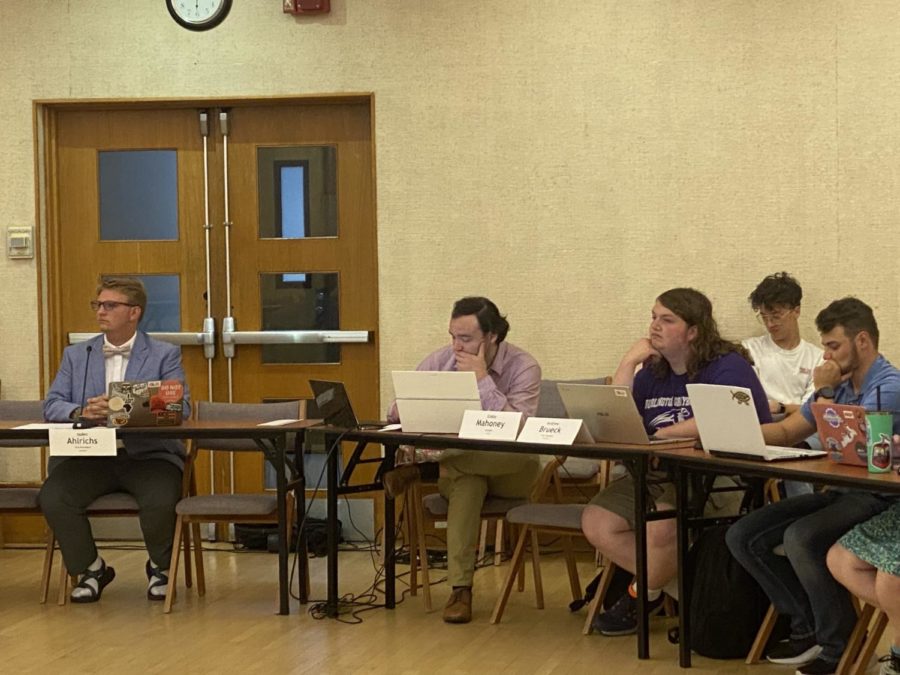What does ISU Student Government do?
The Senate approved Jennifer Seth, a senior in environmental science, to the student initiatives committee Wednesday–here is everything you need to know about Student Government.
Student Government consists of three branches–a legislative, executive and judicial branch–which all split the responsibility of representing the student body through advocacy and empowerment, according to their website. Student Government engages with a wide range of entities not only inside Iowa State but also the larger Ames community.
In the action of their purpose, Student Government has bylaws that serve as an internal check on the actions of its members.
Student Government is responsible for dispersing an approximate $2.3 million collected yearly from student activity fees, with the power of the purse lying with the legislative branch.
Legislative Branch
The legislative branch consists of the Senate and is the largest of the three branches. The Senate is composed of 36 Senate seats, all of whom, in conjunction with the president and vice president of Student Government, are elected in March, inaugurated in April, and serve one-year terms.
The current Senate has 34 seated Senators, and the Senate has the ability to appoint students to fill the vacancies throughout the year through their legislative process.
The Senate also consists of five committees which all focus on different aspects of Student Government’s functions. Those committees are as follows:
- Civic engagement
- Public relations
- Diversity and inclusion
- Student Initiatives
- Finance
All Senators are required to join either a Senate committee or one of the four committees of the executive cabinet, which are as follows:
- Health and Wellness
- Green Initiative
- Legislative Ambassadors
- Sustainability
Two Senators are chosen by the Senate to serve as speaker and vice speaker, who oversee the administration of the affairs of the Senate. Edward “Eddie” Mahoney, a graduate student in computer science, currently serves as speaker of the Senate.
“As Speaker of the Senate, I pretty much run Senate,” Mahoney said. “I make sure that we’re able to pass bills; I handle […] doing all of our agendas, keeping track of all our bills, cleaning them up as they get submitted, honestly, writing a lot of our bills.”
Mahoney added that he also keeps track of the bylaws and the Student Government constitution in hopes of keeping them “sane.”
“Our job as Senators–the biggest goal– is to give voice to students so that their issues are being heard by the people that can do something about it,” Mahoney said.
When the Senate passes legislation, it is sent to the executive branch where the president can either veto or approve a bill. If no action is taken by the president, the legislation will become law in six days.
Executive Branch
The executive branch is led by the President of Student Government, Jacob Ludwig, a senior in economics and political science, and his Vice President Jaden Ahlrichs, a senior in global resource systems.
Ludwig said most of his authority as president comes from his presence in situations in which he is the sole representative of the student body.
“My job, in the broadest sense, is really to be a representative of the student body to the university administration,” Ludwig said. “There’s a lot of higher level administration officials and different committees throughout the university that I am appointed to, and basically, I go into those rooms, and I advocate for students’ interests in whatever decision may be happening.”
Ludwig said his main focus this year is on mental health resources and violence prevention. He aims to promote the resources offered by Iowa State, as well as potentially expanding existing ones.
Along with Ludwig and Ahlrichs, the executive branch has 21 cabinet positions, which are all appointed by the president. The president also appoints all of the Justices for the Supreme Court of the judicial branch.
Judicial Branch
Justices appointed to the Supreme Court by the president and approved by the Senate serve until they either resign, are removed or if they are no longer enrolled at Iowa State. Chief Justice Alex Cecil, a senior in agronomy and mechanical engineering, has served on the Court since spring 2020.
The Court functions as a means of appeal for student organizations that are denied funding by the Senate, settling disputes regarding Student Government elections, as well as a forum for conflict-resolution.
“If there’s conflict among student organizations, we’re a way to go through those without going to someone else,” Cecil said. ”So if it’s not that big of a deal, if it’s not larger legal implications, we can help handle that.”
Cecil said prior to the initial COVID-19, the judicial branch was “reformed,” and part of the new initiative of the Court is to be of more benefit to students and to have more involvement with the other branches.
The Senate meets every Wednesday at 6 p.m. in the Campanile room of Memorial Union, where they vote and discuss various pieces of legislation. Every meeting has an opportunity for a public forum where observers of the meeting can share comments with the Senate.
Your donation will support the student journalists of the Iowa State Daily. Your contribution will allow us to purchase equipment, send our student journalists to conferences and off-set their cost of living so they can continue to do best-in-the-nation work at the Iowa State Daily.











